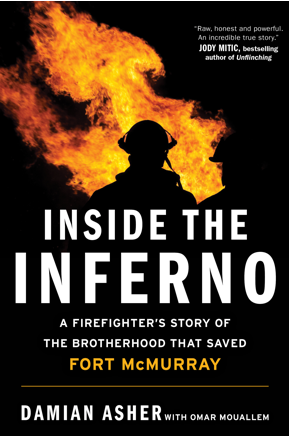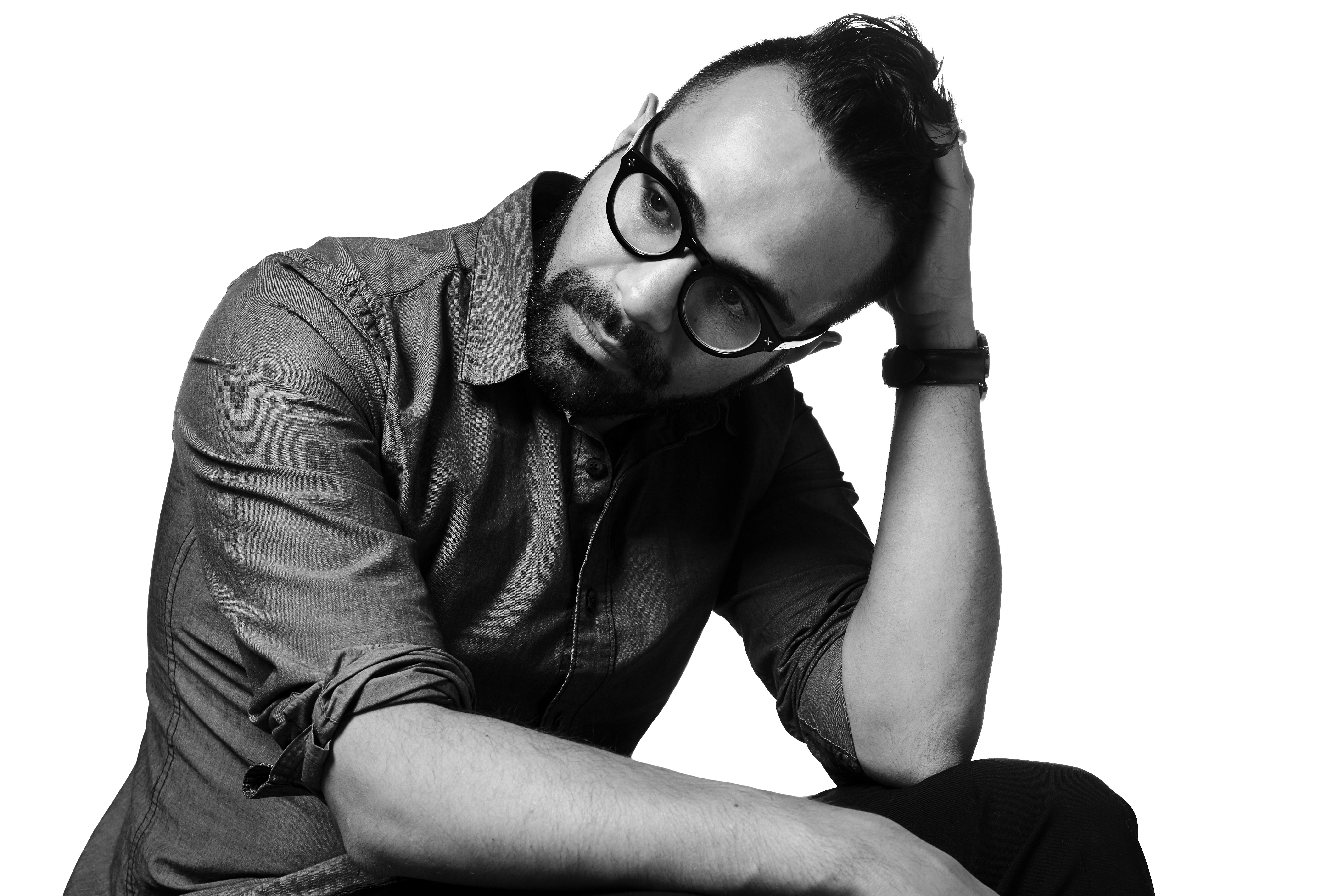May 1, 2017

 For creative nonfiction writer, journalist and Film Arts alumnus, Omar Mouallem his career after Langara did not go as planned. After moving to Vancouver from Alberta to become a filmmaker, Omar discovered his love for storytelling led him down a different path as a freelance writer for some of Canada’s top magazines and the likes of Reader’s Digest, NewYorker.com, Rolling Stone, and The Guardian.
For creative nonfiction writer, journalist and Film Arts alumnus, Omar Mouallem his career after Langara did not go as planned. After moving to Vancouver from Alberta to become a filmmaker, Omar discovered his love for storytelling led him down a different path as a freelance writer for some of Canada’s top magazines and the likes of Reader’s Digest, NewYorker.com, Rolling Stone, and The Guardian.
Omar just finished writing Inside the Inferno, a book on the McMurray Wildfires, which he co-wrote with fire captain Damian Asher and spoke to Alumni Relations about his career after Langara.
Why did you choose Langara?
I moved to Vancouver from Alberta to complete a one-year diploma in screenwriting in Vancouver. After finishing the program, I didn’t feel confident with my film education and wanted something better rounded with more technical expertise. Most film education programs are expensive, or four-years longer, or both. That year, Langara announced its new Film Arts program, which was eight months long, affordable and promised hands-on experience. And it certainly delivered on that promise.
What are you doing now?
I’m a creative nonfiction writer and journalist. Over the last few years, I’ve been lucky enough to carve out a career freelancing for Canada’s top magazines as well as some international markets like Reader's Digest, NewYorker.com, Rolling Stone, and The Guardian.
I have just finished writing Inside the Inferno, a book on the Fort McMurray Wildfires, which I co-wrote with fire captain Damian Asher. It’s an on-the-ground look at those harrowing, sleepless three days of battling “The Beast” and the sacrifices firefighters made to keep the nation’s costliest natural disaster in history from being significantly worse.
I mainly write narrative journalism — true stories that read like fiction, as something literary, but is thoroughly reported and researched. I live in Edmonton, which surprises people who think you need to live in Vancouver or Toronto, or leave the country, to write for international audiences, but in fact Alberta is a great place to be a storyteller, with a complex political, economic and social environment rife with issues. A lot of big personalities come to my home province, and I love writing about this fascinating region.
How has your education contributed to your current career and success?
Life zigzags sometimes. I moved to Vancouver 14 years ago to be a filmmaker, but that’s not what I ended up being. I dabbled in it a bit, but found that I was happiest working on my own with many short-term projects. I also found myself attracted more to nonfiction than fiction. At the same time, storytelling is storytelling, and I learned the fundamentals of narrative through my film degree, with an emphasis on visual details. The cardinal rule in writing is “show don’t tell,” and nowhere is this truer than in film, where the directors, editors, actors and screenwriters must find ways of presenting information to the ears and eyes. Scripts are stripped down to short, declarative sentences and just the necessary dialogue to move a story along.
I don’t think this is just useful for filmmakers — I think all writers can learn from that. So, when I interview for a story or sit down to write a reported, feature article, and especially on Inside the Inferno, I am looking for those telling details that show character, personality and motivation, those quotes that do the same and drive the narrative forward. And certainly when I’m editing I’m looking for the same florid writing and hammed dialogue that I was taught to avoid like the plague. I tend to write my articles with many visual details and often write in scenes of sort. For instance, for a profile of Bret the Hitman Hart I followed him around to physiotherapy, a hockey game, and dinner—moments that provided a setting for the reporting. I don’t think I’d be as comfortable with these techniques were it not for my film education.
What advice would you give to anyone considering a career in your field?
Don’t waste energy on comparing yourself to others. It’s a highly competitive industry, with far more people wanting to do the work than opportunities available, but don’t get caught up in competing with anyone but yourself. There are a number of reasons for this.
- You will never out-write your counterparts - it’s not a quantitative practice; it’s just art, and everyone brings something different to it, so you should focus on what’s going to make your work uniquely yours and appreciated.
- Even if you did out-write someone, you’re not necessarily rising to your best.
- Writing, and really all artistic practices, tend to attract a lot of egos, fame-seekers and toxic personalities who will try to pull you down. Rise above them because getting upset about others' success over yours, whether you think it's deserved or not, will eat you alive. Envy will eat you alive. And most importantly it will distract you from your work.
How did Langara get you to where you are now?
It wasn’t a clear path, but there were two things from my Langara days that led me there.
A fellow student and friend in the program, David Bertrand, was writing stories for a local music magazine called The Nerve. Though it didn’t pay, he got to interview rock star musicians and go to free shows all the time. He connected me with his editor and I started doing the same. I didn’t know that I’d like journalism but honestly it was such a joy to work alone, from home, to tell these amazing stories, and to see my work reach an audience in such a short time.
The other thing of course was that I understood film narratives in a very thorough and practical way, which combined with the journalism I was now doing gave me the idea of being a film critic. After moving to Edmonton after graduating in 2006, I started reviewing movies for local papers. Movie critics enjoy a lot of creative latitude in style and technique, which eventually made me comfortable with feature writing on a variety of topics. I sort of learned the reporting stuff on the job, but the basics of storytelling were something ingrained in me at school.
Was writing a book a lifelong dream or an unexpected joy?
Every journalist secretly or not so secretly dreams of writing a book. That it would be with a major publisher on a major historic event is not something I could have imagined even five years ago. You just don’t know where life takes you until you get there sometimes. This particular opportunity came from an article I wrote for SHARP magazine called “Taming the Beast.”
One of the joys of my job is I can get access to people far more powerful, interesting or courageous than I’ll ever be. For this, I spent period of time with what is now the most famous fire department in the country, even sleeping at the fire hall some nights, awaiting the alarms that’ll send them into harrowing situations. To gradually understand someone’s life that is so different from yours is a miraculous thing. It is empathy in real time, and especially so for this book because I wrote it in the voice of Captain Damian Asher, one of the most senior captains in the department. I also loved trying to piece together so many different recollections of what was a pretty blurry and exhausting week in their lives, to connect the puzzle, and by the end of it have a perfect hero story than anyone of any age could understand.
What was the most unexpected point/experience in your career so far?
I would have to say, I never thought I’d get the chance to travel as much as I do for my work. I just returned from my second trip to the Arctic in two years. I’ve been to Italy, Kenya, Mexico, and for some reason all over Texas to write fun stories. And, of course, probably any writer who’s had the privilege of working with The New Yorker will tell you that seeing your byline under that logo is practically an out-of-body experience.
Knowing what you know today, what piece of advice would you give your old student self?
Don’t stress so much about whether you’re doing what you thought you’d be doing. Just focus on whether you’re happy with what you’re learning and accomplishing, and if the answer is yes to both than you’re probably on the right track.
What’s next?
I quite liked the pace of book-writing, having one big idea to hold in your head for a year instead of five smaller ideas to juggle at once. So I’m working on another book proposal that I hope will take me through the next year or two.